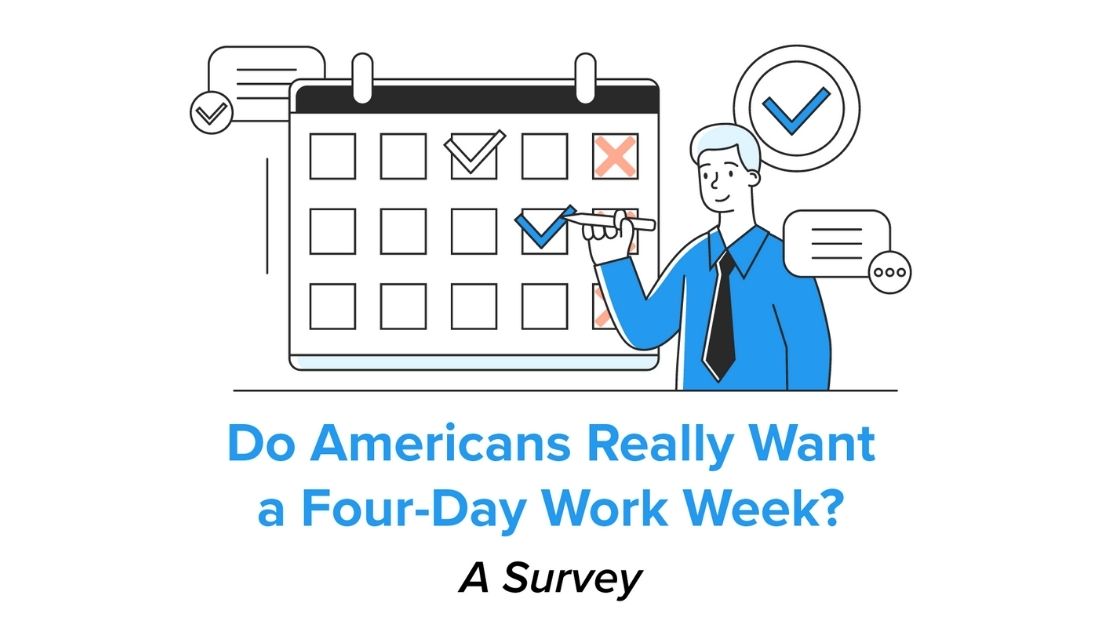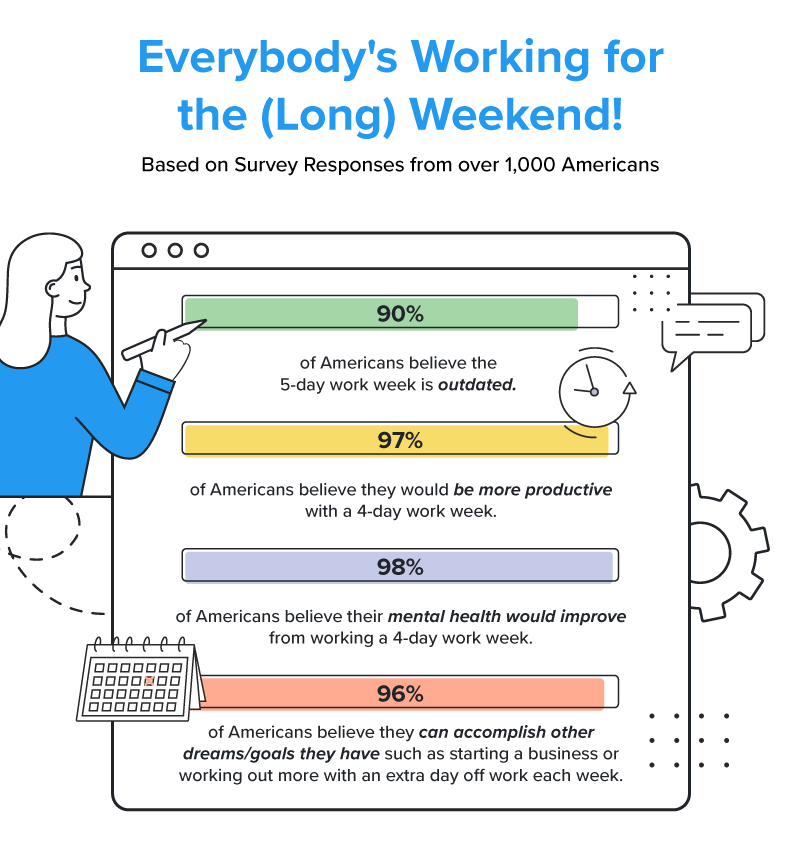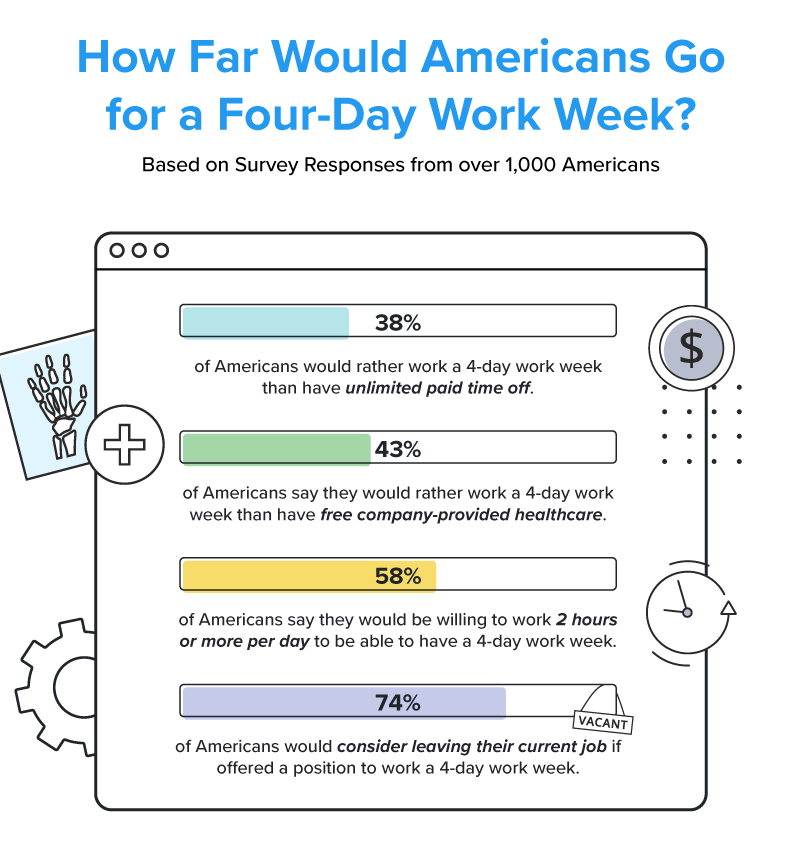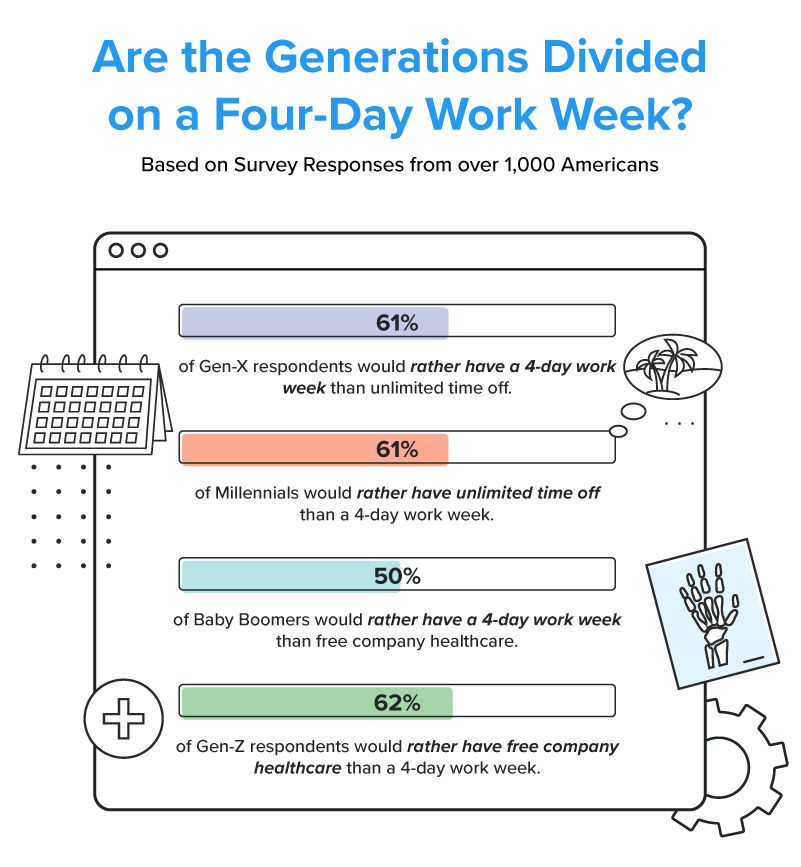Do Americans Really Want a Four-Day Work Week? A Survey
Want a three-day weekend every week? We asked Americans how they really feel about the traditional work week.

Want a three-day weekend every week? We asked Americans how they really feel about the traditional work week.

As Monday mornings roll around, we’re reminded of how far away we are, once again, from the weekend. Working Monday-Friday for 40 hours a week is a typical and exhaustive pattern for most of us in the workforce. But, is it necessary?
Over the last year, the pandemic has completely changed our perception of what a “normal” work week looks like. Shifting out of the ‘normal’ work routine, made many people and companies approach work a little differently. Many of us found ourselves working at home, with strange and unpredictable hours as we balanced work, childcare, selfcare, and all of the other priorities of life. Some even began testing the 4-day work week model. After a year of uncertainty and exhaustion, many benefits were found from these experiments, including better work-life balance, less stress, and even improved productivity. But, is this a model we could and would want to maintain? At SimpleTexting, we’re always interested in how to make work and communication more efficient. So, we were curious, could the 4-day work week model work? And if so, would the switch to a four day work week be something Americans would welcome?
We surveyed over 1,000 Americans to find out how much of the public wants a four-day work week and how far they would be willing to go to get one. Read on to see what we found!

According to survey respondents, an overwhelming 95.4% said they want a four-day work week! It’s no surprise that the amount of weekend downtime is not enough in comparison to the weekday grind. So we wanted to find out just why so many people think we should punch the clock one less day.

90% of survey respondents simply think the 5-day work week is outdated. The idea was introduced by famous carmaker Henry Ford, who was known to set a 40 hour work week for his staff and give them Saturdays and Sundays off. The country then adopted the idea in 1932 to offset the impacts of unemployment during the Great Depression.
So as we’ve looked forward to Fridays for nearly a century now, it’s clear that many are ready for a change. 97% of respondents said they’d be more productive during a 4-day work week. This could go hand in hand with the 98% who say a 4-day work week would improve their mental health. According to many Americans, having more time off to relax and recuperate from the work week would make them more productive once the work week starts.
And though the weekend can be seen as a time to unwind and relax, many also choose that time to be even more productive and get things done that they couldn’t throughout the week. 96% of Americans say they would use the extra day to work on personal goals and dreams. After all, it isn’t “work” if you’re doing what you love.

So after finding out why Americans want a 4-day work week, we wanted to know just how far they’d be willing to go to have one! Nearly three quarters of respondents would be willing to leave their current job if they were offered a position to work a 4-day work week. With so many personal goals and dreams at stake, it’s no surprise that so many would be willing to jump to another company to work one less day.
Looking more closely at benefits, 43% said they would rather work a 4-day work week than have free company-provided healthcare, while 38% would rather have the 4-day model than have unlimited PTO!

But this modern-day work model isn’t necessarily for everyone. When looking at generational differences, Gen-X respondents would rather have a 4-day work week than unlimited time off, while Millennials would rather have the chance to take some much needed leisure time whenever they want. When it comes to free company healthcare, Gen-Z is saying they’d rather clock in for 5 days instead of 4 for free healthcare, while Baby Boomers would prefer to work one less day and pay for healthcare themselves.
It’s clear that the pandemic has shown corporate America that burnout is real and employees want change. Though some employers might be hesitant about a decrease in productivity when it comes to having one less work day, with SimpleTexting, they can easily get in touch with their employees to make sure all their needs are met.
Drew Wilkinson is the Head of Marketing at SimpleTexting. Drew has more than a decade of experience managing successful integrated marketing programs to build brands, raise awareness, and generate demand.
More Posts from Drew WilkinsonLearn how our bulk text messaging service helped a home health agency coordinate messages and communication across their business.
ReadLearn how to use text messages to communicate with employees to ensure your team sees essential updates.
ReadStart a text marketing campaign or have a 1-on-1 conversation today. It's risk free. Sign up for a free 14-day trial today to see SimpleTexting in action.
No credit card required